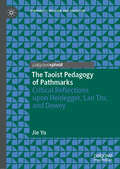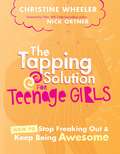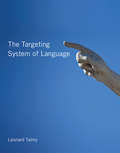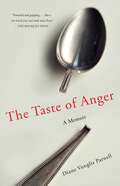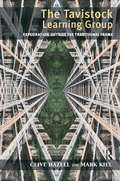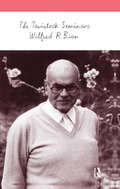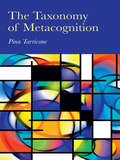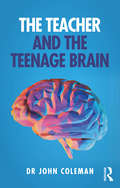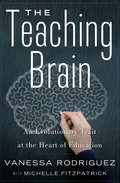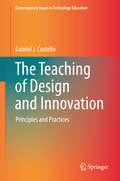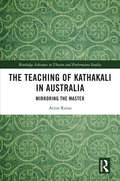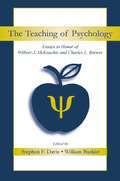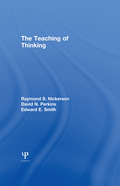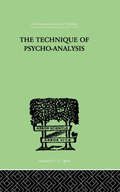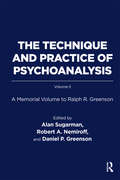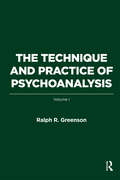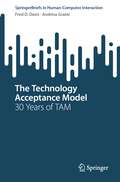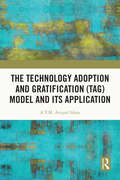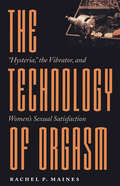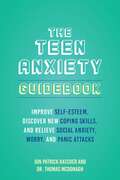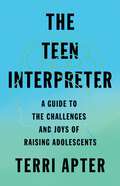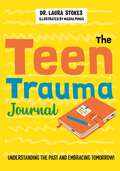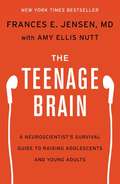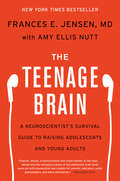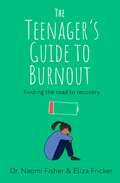- Table View
- List View
The Taoist Pedagogy of Pathmarks: Critical Reflections Upon Heidegger, Lao Tzu, And Dewey (Spirituality, Religion, and Education)
by Jie YuBased on the intertwined complex conversations among Heidegger, Dewey, and Lao Tzu, this book explores the possibilities of the Taoist Pedagogy of Pathmarks as a clearing between truth and untruth, responding to the spiritual call of Tao as inaction and teaching as releasement. In this book, Yu provides a critical exploration of the rich dynamics in the “direct” conversations among the three great thinkers of east and west, highlighting the implications of their ideas for education throughout. As more educational researchers, teacher educators, and teachers recognize the limitations of didactic teaching-as-telling, the author brings an alternate pathway to light.
The Tapping Solution for Teenage Girls: How to Stop Freaking Out and Keep Being Awesome
by Christine WheelerIn this book, Christine Wheeler tells teenage girls about some super easy relaxation techniques they can do by themselves to help them stop freaking out about stuff that's happening in their life and get back to being their awesome self.
The Targeting System of Language (The\mit Press Ser.)
by Leonard TalmyA proposal that a single linguistic/cognitive system, “targeting,” underlies two domains of reference, anaphora (speech-internal) and deixis (speech-external).In this book, Leonard Talmy proposes that a single linguistic/cognitive system, targeting, underlies two domains of linguistic reference, those termed anaphora (for a referent that is an element of the current discourse) and deixis (for a referent outside the discourse and in the spatiotemporal surroundings). Talmy argues that language engages the same cognitive system to single out referents whether they are speech-internal or speech-external.Talmy explains the targeting system in this way: as a speaker communicates with a hearer, her attention is on an object to which she wishes to refer; this is her target. To get the hearer's attention on it as well, she uses a trigger—a word such as this, that, here, there, or now. The trigger initiates a three-stage process in the hearer: he seeks cues of ten distinct categories; uses these cues to determine the target; and then maps the concept of the target gleaned from the cues back onto the trigger to integrate it into the speaker's sentence, achieving comprehension. The whole interaction, Talmy explains, rests on a coordination of the speaker's and hearer's cognitive processing. The process is the same whether the referent is anaphoric or deictic.Talmy presents and analyzes the ten categories of cues, and examines sequences in targeting, including the steps by which interaction leads to joint attention. A glossary defines the new terms in the argument.
The Taste of Anger: A Memoir
by Diane Vonglis Parnell&“I&’ll kill the first person who comes through this door.&” My father grips a baseball bat in his meaty hands.It is 1962 and Diane is three years old when her violent father moves their family—her, her pregnant mother, and her six siblings—to a remote farm in Upstate New York. There, she grabs the reader by the hand and takes them to the broken-down barns, barren fields, and rows of bunk beds in her rat-infested attic bedroom as she questions all that feels wrong about her new world. She watches her ever-pregnant mother grow emotionally colder with each new baby and wonders, Where is she when he swings his fists, his steel-toed boot, or a crowbar? Forced to perform adult manual labor in between the erratic beatings she and her siblings pound on one another to release their own aggressions, she asks herself, Is this what we&’ve become? What I&’ve become?Narrated in the ever-hopeful voice of a child, The Taste of Anger explores in raw, unflinching detail how years of isolation, oppression, and the threat of retaliation create an environment in which family secrets are guarded at all costs. Tension is palpable with the turning of each page, ensuring that the reader won&’t let go of Diane&’s hand until she gets an answer to her most urgent question of all: Who will rescue us?
The Tavistock Learning Group: Exploration Outside the Traditional Frame
by Clive HazellIn The Tavistock Learning Group: Exploration Outside the Traditional Frame, the authors attempt to expand the heuristic, theoretical, and applied dimensions of Group Relations paradigms by pairing classical Group Relations concepts with typically non-Tavistock psychology paradigms and social sciences concepts. Under the broad domain of psychologically-informed constructs, Lacanian psychoanalysis, existential philosophy and bioenergetics are applied. Under a somewhat broader range of social science conceptualization, the capacity for abstraction is linked with anti-work in groups, the large group is re-imagined as an extension of community dynamics and dysfunction, and the role of symbol systems, symbology and semiotics are examined in relation to sophisticated work groups. Lastly, non-Tavistock models of group development and conceptualization are re-interpreted and explained using a group-as-a-whole framework.
The Tavistock Seminars
by Wilfred R. BionPreviously unpublished lectures from Wilfred Ruprecht Bion. The book consists of eight talks Bion gave at the Tavistock Clinic between 1976 and 1979. Topics explored include the importance of observation; dreams; art and psychoanalysis; and the significance of time in psychoanalysis. In addition, this volume includes an illuminating interview of Bion by Anthony G. Banet in 1976.'In your practice you will find yourself under pressure. You say whatever you have to say, and then there is an entirely new situation. You don't really know what is going on because it is an entirely new situation, things will not be the same. It is likely enough that the patient will say, "Why don't you say something?" Or if not the patient, the relatives - "Why don't you do something?" So you are always under pressure prematurely and precociously to produce your idea. Poor little thing! Pull it up by the roots and have a look at it - it hasn't got a chance. So you have to act as a sort of parent to the idea - protect it and give it a chance to grow in spite of these pressures; you have to be able to tolerate this state of ignorance.'- W.R. Bion
The Taxonomy of Metacognition
by Pina TarriconeMetacognition is a complex construct which is fundamental to learning. Its complex, fuzzy and multifaceted nature has often led to its colloquial application in research, resulting in studies that fail to identify its theoretical foundation or elements. In response to this, the research community continues to call for a comprehensive understanding of the construct of metacognition. This book is a response to this call for clarity. Pina Tarricone provides a theoretical study of the construct of metacognition in terms of psychological theory. The first part of the book analyses the relationship between reflection and metacognition, and the second part goes on to analyse the construct of metamemory as the foundation of metacognition. The third and final part of the book analyses the construct of metacognition to present the final conceptual framework of metacognition and the taxonomy of metacognition. This framework builds a picture and a nexus of the construct through visual links to the related concepts that contribute to what is known as metacognition. The Taxonomy of Metacognition provides a comprehensive representation and categorisation of all of the terms, concepts, categories, supercategories, subcategories and elements of metacognition. It clarifies the construct so that researchers and teachers can develop a better understanding of it. This important and broad ranging contribution can be applied to many related areas, by researchers, psychologists, teachers and any profession interested in psychological learning processes.
The Teacher and the Teenage Brain
by John ColemanThe Teacher and the Teenage Brain is essential reading for all teachers and students of education. This book offers a fascinating introduction to teenage brain development and shows how this knowledge has changed the way we understand young people. It provides a critical insight into strategies for improving relationships in the classroom and helping both adults and teenagers cope better with this stage of life. Dr John Coleman shows how teachers and students can contribute to healthy brain development. The book includes information about memory and learning, as well as guidance on motivation and the management of stress. Underpinned by his extensive work with schools, Dr Coleman offers advice on key topics including the importance of sleep, the social brain, moodiness, risk and risk-taking and the role of hormones. This book is extensively illustrated with examples from classrooms and interviews with teachers. It explicitly links research and practice to create a comprehensive, accessible guide to new knowledge about teenage brain development and its importance for education. Accompanied by a website providing resources for running workshops with teachers and parents, as well as an outline of a lesson plan for students, The Teacher and the Teenage Brain offers an innovative approach to the understanding of the teenage brain. This book represents an important contribution to teacher training and to the enhancement of learning in the classroom.
The Teaching Brain: An Evolutionary Trait at the Heart of Education
by Vanessa Rodriguez Michelle Fitzpatrick&“A significant contribution to understanding the interaction among teachers, students, the environment, and the content of learning&” (Herbert Kohl, education advocate and author). What is at work in the mind of a five-year-old explaining the game of tag to a new friend? What is going on in the head of a thirty-five-year-old parent showing a first-grader how to button a coat? And what exactly is happening in the brain of a sixty-five-year-old professor discussing statistics with a room full of graduate students? While research about the nature and science of learning abounds, shockingly few insights into how and why humans teach have emerged—until now. Countering the dated yet widely held presumption that teaching is simply the transfer of knowledge from one person to another, The Teaching Brain weaves together scientific research and real-life examples to show that teaching is a dynamic interaction and an evolutionary cognitive skill that develops from birth to adulthood. With engaging, accessible prose, Harvard researcher Vanessa Rodriguez reveals what it actually takes to become an expert teacher. At a time when all sides of the teaching debate tirelessly seek to define good teaching—or even how to build a better teacher—The Teaching Brain upends the misguided premises for how we measure the success of teachers. &“A thoughtful analysis of current educational paradigms . . . Rodriguez&’s case for altering pedagogy to match the fluctuating dynamic forces in the classroom is both convincing and steeped in common sense.&” —Publishers Weekly
The Teaching of Design and Innovation: Principles and Practices (Contemporary Issues in Technology Education)
by Gabriel J. CostelloThis book is about design and innovation – what it is and how to teach it. The blending of design and innovation is having an increasing impact not only on the world of products and services but on a wide variety of disciplines such as information and communications technology (ICT), business, education and medicine. However, there is a lack of books on teaching the subject despite the significant growth of interest in both academia and the workplace. This book addresses this gap by outlining foundational principles for the teaching of design and innovation and by offering a practical process for implementing the pedagogy in academic institutions and outside academia in the context of continuing professional development (CPD). It describes two undergraduate case-studies that aimed to instill design and innovation competences in students of both engineering and business disciplines. The cases involved student teams working with incubation centre start-ups and multi-national subsidiaries. One of the aims of this book is to provide a resource for continuing professional development (CPD). Consequently, a third practitioner-based case study is presented as an example of research-informed teaching. In addition, the book proposes the concept of Simulation-Action Learning (SAL) as an enhancement of Project-Based Learning (PBL).
The Teaching of Kathakali in Australia: Mirroring the Master (Routledge Advances in Theatre & Performance Studies)
by Arjun RainaThis book tells the story of teaching Kathakali, a seventeenth century Indian dance-drama, to contemporary performers in Australia. A rigorous analysis and detailed documentation of the teaching of multiple learners in Melbourne, both in the group workshop mode and one-on-one, combined with the author’s ethnographic research in India, leads to a unique insight into what the author argues persuasively is at the heart of the art’s aesthetic- a practical realisation of the theory of rasa as first articulated in the ancient Sanskrit treatise on drama The Natyashastra. The research references the latest discoveries in neuroscience on ‘mirror neurons’ and argues for a reconceptualization of Kathakali’s imitative methodology, advancing it from the reductive category of ‘mimicry’ to a more contemporary and complex mirroring which is where its value lies in Australian actor performer training. The Teaching of Kathakali in Australia will be of great interest to students and scholars of theatre and dance, intercultural actor training, practice-led research, and interdisciplinary studies of neuroscience and performance.
The Teaching of Psychology: Essays in Honor of Wilbert J. McKeachie and Charles L. Brewer
by Stephen F. Davis William BuskistThe Teaching of Psychology is centered around the masterful work of two champions of the teaching of psychology, Wilbert J. McKeachie and Charles L. Brewer, in order to recognize their seminal contributions to the teaching of the discipline. The book's main goal is to provide comprehensive coverage and analysis of the basic philosophies, current issues, and the basic skills related to effective teaching in psychology. It transcends the typical "nuts and bolts" type books and includes such topics as teaching at small colleges versus a major university, teaching and course portfolios, the scholarship of teaching, what to expect early in a teaching career, and lifelong learning.The Teaching of Psychology also features: Biographies of Bill McKeachie and Charles L. Brewer Fourteen chapters written by leading authorities in the teaching of psychology, which provide overviews of the latest psychological research and theories in effective college and university teaching. These chapters cover lecturing, classroom presence, using humor in teaching, pedagogy, advising, teaching critical thinking, writing, and technology, and training graduate students to teach Useful advice to new teachers and seasoned veterans, including qualities of master teachers, understanding the many facets of working within the academy, and teaching with technology Insights into teaching specific courses within the psychology curriculum, including the history of psychology, biological psychology, statistics and research methods, learning, social psychology, personality, psychology of women, cross-cultural psychology, industrial/organizational psychology, psychology of religion, and environmental psychology A closing section containing Bill McKeachie's and Charles L. Brewer's perspectives into the teaching of psychology and its history, highlights, and future. This book is intended for academic psychologists who teach and/or train graduate assistants to teach at the college and university level. All royalities from this book will be donated to the Society for the Teaching of Psychology (Division 2 of the American Psychological Association), which each year sponsors many activities across the country to promote the teaching of psychology.
The Teaching of Thinking
by D. N. Perkins R. S. Nickerson E. E. SmithFirst published in 1985. This book was created due to involvement of the authors to develop a course to enhance thinking skills. A main aim of which was to determine what is known about the teaching of thinking from current research literature and from the results of efforts to develop cognitive enhancement programs. The primary focus is on intentional, purposeful, goal-oriented thinking-thinking, if you will, for the express purpose of realizing some specific objective.
The Technique Of Psycho-Analysis (International Library Of Psychology Ser.)
by Forsyth, DavidFirst Published in 1999. Routledge is an imprint of Taylor & Francis, an informa company.
The Technique and Practice of Psychoanalysis: A Memorial Volume to Ralph R. Greenson
by Ralph R. GreensonThe discovery of several incomplete chapters of Ralph R. Greenson's long-awaited Volume II of The Technique and Practice of Psychoanalysis form the cornerstone of this memorial to a man considered by many to be the best clinical psychoanalyst of his generation. Using the detailed outlines of the chapters that Greenson had intended to write, the editors solicited prominent American psychoanalysts to cover the planned content areas. Such adherence to Greenson's plan makes this a worthy companion to Volume I.
The Technique and Practice of Psychoanalysis: Volume I
by Ralph R. GreensonThis systematic and comprehensive volume, written in a lively and clear style, is devoted essentially to the fundamentals of psychoanalytic technique: transference and resistance. The author approaches psychoanalytic technique from a classical theoretical framework, but he frequently gives an entirely fresh view of traditionally accepted procedures. His most important new contribution consists in the clear distinction between the patient's 'real relationship' to the analyst, the 'working alliance', and the transference relationship. His discussion of the contradictory and often conflicting demands which each of these elements makes on the technical skills of the analyst is particularly illuminating. In many fascinating case illustrations, he shows how the analyst carries out therapeutic psychoanalysis while respecting the diversity of psychic constellations in different patients and at different points in their analyses. This book can be recommended - without qualification - to the beginning student because of the thorough clarification and documentation of the basic principles of psychoanalytic technique.
The Technology Acceptance Model: 30 Years of TAM (Human–Computer Interaction Series)
by Fred D. Davis Andrina GranićThis SpringerBrief discusses the origins, emergence, evolution, and future of the Technology Acceptance Model (TAM). TAM, simple yet powerful, has been extensively validated, standing as a leading scientific paradigm and a reliable model for explaining, predicting, and improving user acceptance across a spectrum of technological deployments. Over more than three decades since the introduction of TAM, numerous extensions have emerged, incorporating additional variables and collectively referred to as “TAM++”. However, perceived usefulness and perceived ease of use remain the basic beliefs of the core TAM model. The introductory chapter “Once upon a TAM” focuses on the challenging search for a user acceptance crystal ball, showing that it is indeed possible to consistently predict, explain, and improve user acceptance. “Evolution of TAM” traces the model's growth and adaptability, exploring the proliferation of selected TAM-related behavioural intention models, several integrated theoretical approaches, the quest for other behavioural intention antecedents, and TAM’s versatile applications in various contexts. “Revolution of TAM” presents an in-depth systematic review, encompassing a meta-analysis of selected TAM reviews and meta-analyses, and a narrative review of representative primary studies, providing a thorough and extensive understanding of the TAM universe. The epilogue “What will the Future of TAM be Like?” provides insights into its dynamic future. This SpringerBrief concludes with seven actionable principles, serving as a strategic guide for those aiming to customize the TAM++ body of knowledge for application-oriented studies within a particular context. This comprehensive overview of TAM is a valuable source of information for researchers, practitioners, and all interested readers, especially those new to the field.
The Technology Adoption and Gratification (TAG) Model and Its Application
by A.Y.M. Atiquil IslamThe book introduces Technology Adoption and Gratification (TAG) Model and its application in higher education, technical and vocational education, postsecondary education and cross-culture.The author demonstrates the fundamentals of technology adoption and gratification—what it comprises and how to expand it. The book describes how the viability of the TAG model was tested using Structural Equation Modeling for teaching, learning and research purposes, which could assist academicians and practitioners in performing technological measurements in all arenas of education.The book will attract researchers, students and practitioners who have backgrounds in educational technology, educational psychology, library & information science, technical and vocational education or STEM education.
The Technology of Orgasm: "Hysteria," the Vibrator, and Women's Sexual Satisfaction (Johns Hopkins Studies in the History of Technology #24)
by Rachel P. MainesWinner of the Herbert Feis Prize from the American Historical Association Winner of the AFGAGMAS Biennial Book AwardWinner of the Science Award from the American Foundation for Gender and Genital Medicine From the time of Hippocrates until the 1920s, massaging female patients to orgasm was a staple of medical practice among Western physicians in the treatment of "hysteria," an ailment once considered both common and chronic in women. Doctors loathed this time-consuming procedure and for centuries relied on midwives. Later, they substituted the efficiency of mechanical devices, including the electric vibrator, invented in the 1880s. In The Technology of Orgasm, Rachel Maines offers readers a stimulating, surprising, and often humorous account of hysteria and its treatment throughout the ages, focusing on the development, use, and fall into disrepute of the vibrator as a legitimate medical device.
The Teen Anxiety Guidebook: Improve Self-Esteem, Discover New Coping Skills, and Relieve Social Anxiety, Worry, and Panic Attacks
by Dr. Thomas McDonagh Jon Patrick HatcherBreak free from anxiety and manage stress with simple strategies and cognitive behavioral therapy (CBT) techniques in this straightforward and encouraging handbook.Keeping up with friendships, relationships, school, extracurriculars, and social media is already a lot of work. And when anxiety spikes, it sometimes feels like it&’s impossible to keep your life on track. You might feel like you&’re in a never-ending downward spiral. That&’s where this book comes in. The Teen Anxiety Guidebook offers dozens of beneficial quizzes, activities, tips and CBT-based advice to help you: Identify your most common anxiety triggers Learn essential coping skills to prevent anxiety attacks Redirect risky behavior, including substance abuse and self-harm Understand the options of therapy and medication Overcome the spike-and-relapse cycle From mindfulness meditation to diaphragmatic breathing, the exercises in this book will give you the tools you need to redirect negative thought and behavioral patterns and navigate the difficulties of life.
The Teen Interpreter: A Guide to the Challenges and Joys of Raising Adolescents
by Terri ApterThe Teen Interpreter is a generous roadmap for enjoying the most challenging, and rewarding, parenting years. Once children hit adolescence, it seems as if overnight “I love you” becomes “leave me alone,” and any question from a parent can be dismissed with one word: “fine.” But while they may not show it, teenagers rely on their parents’ curiosity, delight, and connection to guide them through this period of exuberant growth as they navigate complex changes to their bodies, their thought processes, their social world, and their self-image. In The Teen Interpreter, psychologist Terri Apter looks into teens’ minds—minds that are experiencing powerful new emotions and awareness of the world around them—to show how parents can revitalize their relationship with their children. She illuminates the rapid neurological developments of a teen’s brain, along with their new, complex emotions, and offers strategies for disciplining unsafe actions constructively and empathetically. Apter includes up-to-the moment case studies that shed light on the anxieties and vulnerabilities that today’s teens face, and she thoughtfully explores the positives and pitfalls of social media. With perceptive conversation exercises that synthesize research from more than thirty years in the field, Apter illustrates how teens signal their changing needs and identities—and how parents can interpret these signals and see the world through their teens’ eyes. The Teen Interpreter is a generous roadmap for enjoying the most challenging, and rewarding, parenting years.
The Teen Trauma Journal: Understanding the Past and Embracing Tomorrow!
by Laura StokesThis therapeutic journal provides you with the tools and coping strategies you need to better look after yourself. Covering topics such as attachment, thinking styles, self-esteem and new relationships, it looks at how early relationships and trauma may have impacted you, and supports you in planning for your future. Authored by experienced Consultant Clinical Psychologist Laura Stokes, this journal will be a source of support and guidance you as you navigate life's ups and downs.
The Teenage Brain: A Neuroscientist's Survival Guide To Raising Adolescents And Young Adults
by Frances E. Jensen Amy Ellis NuttNew York Times Bestseller<P><P> Drawing on her research knowledge and clinical experience, internationally respected neurologist—and mother of two boys—Frances E. Jensen, M.D., offers a revolutionary look at the science of the adolescent brain, providing remarkable insights that translate into practical advice for both parents and teenagers.<P> Driven by the assumption that brain growth was pretty much complete by the time a child began kindergarten, scientists believed for years that the adolescent brain was essentially an adult one—only with fewer miles on it. Over the last decade, however, the scientific community has learned that the teen years encompass vitally important stages of brain development.<P> Motivated by her personal experience of parenting two teenage boys, renowned neurologist Dr. Frances E. Jensen gathers what we’ve discovered about adolescent brain functioning, wiring, and capacity and, in this groundbreaking, accessible book, explains how these eye-opening findings not only dispel commonly held myths about the teenage years, but also yield practical suggestions that will help adults and teenagers negotiate the mysterious world of adolescent neurobiology.<P> Interweaving clear summary and analysis of research data with anecdotes drawn from her years as a parent, clinician, and public speaker, Dr. Jensen explores adolescent brain functioning and development in the contexts of learning and multitasking, stress and memory, sleep, addiction, and decision-making.<P> Rigorous yet accessible, warm yet direct, The Teenage Brain sheds new light on the brains—and behaviors—of adolescents and young adults, and analyzes this knowledge to share specific ways in which parents, educators, and even the legal system can help them navigate their way more smoothly into adulthood.
The Teenage Brain: A Neuroscientist's Survival Guide to Raising Adolescents and Young Adults
by Frances E. Jensen Amy Ellis NuttDrawing on her research, knowledge, and clinical experience, internationally respected neurologist--and mother of two boys--Frances E. Jensen, MD, offers a revolutionary look at the adolescent brain, providing remarkable insights that translate into practical advice both for parents and teenagers.Driven by the assumption that brain growth was almost complete by the time a child reached puberty, scientists believed for many years that the adolescent brain was essentially an adult one--only with fewer miles on it. Over the last decade, however, neurology and neuroscience have revealed that the teen years encompass vitally important stages of brain development.Motivated by her experience of parenting two teenagers, renowned neurologist Frances E. Jensen, MD, gathers what we've discovered about adolescent brain functioning and wiring, and in this groundbreaking, accessible book, explains how these eye-opening findings not only dispel commonly held myths about teens but also yield practical suggestions for adults and teenagers negotiating the mysterious and magical world of adolescent biology.Interweaving clear summary and analysis of research data with anecdotes drawn from her years as a clinician, researcher, and public speaker, Dr. Jensen explores adolescent brain functioning and development in the context of learning and multitasking, stress and memory, sleep, addiction, and decision making. Examining data connecting substance use to lingering memory issues and, sometimes, a lower adult IQ, The Teenage Brain explains why teenagers are not as resilient to the effects of drugs as we previously thought; reveals how multitasking impacts learning ability and concentration; and examines the consequences of stress on mental health during and beyond adolescence.Rigorous yet accessible, warm yet direct, The Teenage Brain sheds new light on the brains--and behaviors--of adolescents and young adults, and analyzes this knowledge to share specific ways in which parents, educators, and even the legal system can help them navigate their way more smoothly into adulthood in our ever challenging world.
The Teenager's Guide to Burnout: Finding the Road to Recovery
by Dr. Naomi Fisher Eliza FrickerAn essential guide for all teenagers experiencing stress and burnoutDoes any of this sound like you? - Lacking in energy and feeling that your life has lost its sparkle- Feeling like you can't ever quite relax- Unable to sleep despite being exhausted all the time- Finding that you don't really enjoy anything anymore, even things you used to love- Feeling that everyone is irritating and no one understands- Finding going to school really hard or not possible at all anymoreThen this book might help. These are signs that you are experiencing burnout − your battery has taken a battering and you are running on empty. Many people think burnout only happens to adults, but it's something lots of teenagers experience too. This book will help you to understand what burnout is, how you got there and what you can do to get back to a life you enjoy. We've written it to help you work out if you might be burnt out, and if so, what you can do about it. It will help you identify some of the ways that you might be getting stuck when you're trying to get better. You'll get some ideas as to what is and isn't helping. And if you decide that you aren't really burnt out but you're heading that way, this book has some ideas to stop it from happening in the future.Co-written by expert clinical psychologist Dr Naomi Fisher, who has helped many teenagers deal with the stresses and pressures of school and life, and by bestselling author and illustrator Eliza Fricker.
